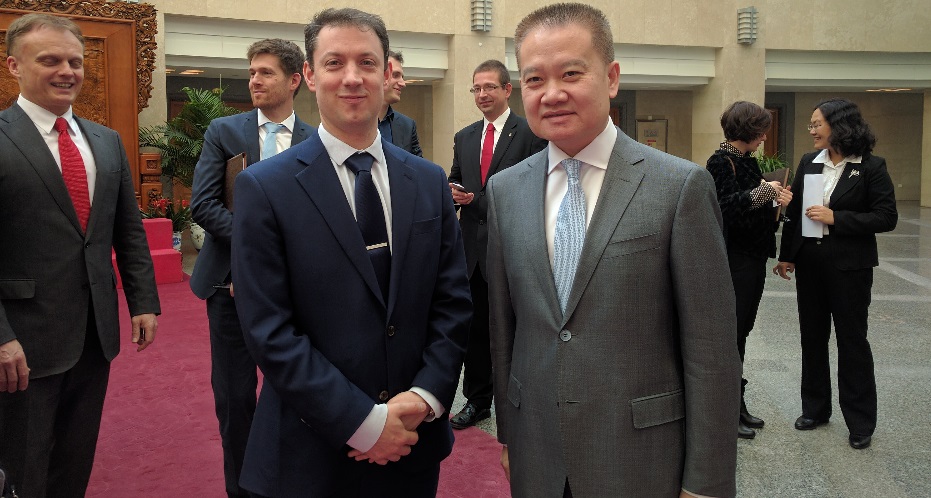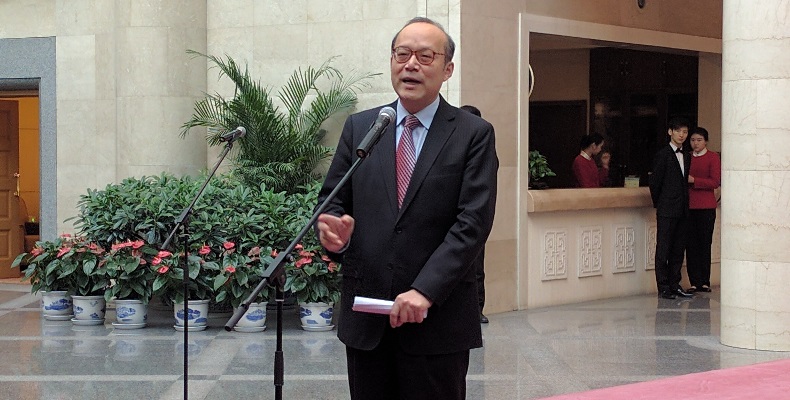Driving commercial and political engagement between Asia, the Middle East and Europe
Driving commercial and political engagement between Asia, the Middle East and Europe
Driving commercial and political engagement between Asia, the Middle East and Europe

I was delighted to be invited by the Chinese government to travel to Beijing last week to take part in their Workshop for European Young Leaders.
I was one of a number of individuals invited from EU member states to take part in discussions with the Chinese Ministry of Foreign Affairs (MFA), other Chinese government departments and private sector organisations on China’s foreign affairs, trade and economic engagement and bilateral relationships, with a particular focus on China’s engagement in Europe.
I was informed that delegates were selected based on the significance of their roles and their ability to influence key groups in their home countries.
Many of the EU member states were represented, but I was the only representative from the UK.
Other participants included political party representatives, parliamentarians, journalists, senior officials, economists and academics.
Early on in the discussions we were informed that the Chinese government had made a number of changes to their approach to diplomatic relations, in particular how their foreign affairs officials and diplomats were trained and prepared for the increasing challenges that China faces as a new major economy in a world growing in complexity.
We were informed that this was a pioneering programme, the first of its kind.
The aim of the discussions was for the Chinese government to share some of their observations on the changing global order and their foreign policy and approach to date and moving forwards.
We were also asked, however, to share our thoughts and offer advice to the MFA as they developed their diplomatic strategies to ensure they are fit for purpose.
China’s EU policy
The activities over the course of a few days consisted of formal sessions to encourage dialogue between the Chinese bodies represented and the European delegates, as well as a great deal of informal engagement and dialogue to build better understanding between both sides. It was clear that our Chinese hosts were very keen to foster improved relations between the participants from the different countries as part of a wider drive to support a better understanding between European countries.

Chen Xu, Director-General of the Department of European Affairs at the MFA, gives welcome remarks to the representatives from Europe
Following a formal welcome at the MFA from Chen Xu, Director-General of the Department of European Affairs, the first session was a lengthy discussion on China-EU relations and China’s EU Policy, led by Qi Mei, Deputy Director-General in the Department of European Affairs.
We had a very frank and wide ranging debate on China’s economic and political engagement with Europe, with plenty of comparisons from the Chinese side with their engagement with Russia and the USA.
The Chinese officials we were engaging were genuinely open to our thoughts on how China was seen in Europe by business, government and the populations at large.
Naturally, my role was to explain Brexit and why the UK had taken the drastic action to vote to leave the EU.
The next session was on the Belt and Road initiative (BRI), a topic which in fact was a concurrent theme throughout the discussions.
Clearly, the Chinese government has invested very heavily in this initiative, both in material terms, but also as a concept for China’s increased engagement in Asia and moving into Europe as they play a greater global role. The discussion took place at the Department for European Studies of the China Institute of International Studies. A number of academics joined from the Chinese side led by Jin Ling, an Associate Research Fellow at the institute who has conducted a significant amount of research into the economic impact of (BRI).
Cybersecurity
The next discussion, which felt the most contentious from the perspective of many of the European delegates was on cybersecurity and China’s regulation of the digital environment in which Chinese citizens are increasingly operating in.
There was a clear concern from some of the participants around freedom of speech and the ability for citizens to engage without interference from the government. The discussion took place at the Bureau of Information Technology Development and was led by Song Xianrong, a Director in the Central Leading Group for Cyberspace Affairs.
The key concerns from the Chinese side were ensuring the “sovereignty of China’s cyberspace” and the protection of critical infrastructure against cyber attacks.
China-EU economic and trade relations
Our next session focused on China’s ‘opening up’ with a specific focus on China-EU Economic and Trade Relations.
This was led by Yao Ling, Research Fellow and Deputy Director at the Institute of European and Eurasian Studies (part of the Chinese Academy of International Trade and Economic Cooperation).
Eastern Europe
It was clear throughout the discussions that China greatly values its engagement in Eastern Europe as part of its 16+1 initiative. In this session, however, there was very detailed discussion on the key infrastructure projects which had been funded and developed by Chinese state-owned and private companies, and it was clear from the delegates from some of the Eastern European countries that there was a strong sense of shared appreciation for this investment which was frequently referred to as a ‘win-win’ for Europe and China.
Following a meeting and discussion with Liu Haixing, an MFA minister who had just returned from Shanghai where he had led the 2016 UK-China High Level People to People Dialogue, we visited the offices of JD.com, China’s e-commerce giant, for a tour of their facilities and a discussion on the future of China’s internal consumer market and engagement with international markets via increasingly sophisticated digital platforms by both wholesale and retail consumers.
Both during the visit to JD.com, but also judging by the various people we met in Beijing, it was interesting how Chinese people – across all generations – have adopted and embraced new technologies. I had a strong sense of how innovative and adaptive Chinese technology had become to consumer demand.
I had two fascinating observations from all these discussions.
Eastern and Western Europe ‘two distinct regions’
The first is that China views Eastern and Western Europe as two very distinct regions, with a very different economic and political focus on each region.
Clearly, for China, there is a greater sense of shared values and a genuine sense of friendship with the former communist countries in Eastern Europe.
It was clear to me that the Chinese government very much values the openness that they have been shown by the Eastern European countries, hailing their infrastructure projects there as a visible indication that they can provide excellent connectivity in the region, fuelling trade and economic exchange.
The other interesting observation is that Germany was not represented in the group of European participants, a number of whom were very curious about this. We were told that Germany had their own dedicated programme with China, suggesting that Germany held as much importance to China as the rest of the European continent when it comes to trade and investment.
As well as the formal discussions, we had a great deal of time to engage with other visitors from Europe, as well as with our Chinese hosts, on a very wide range of topics.
I was very pleased to be able to share my views on China’s diplomatic strategies and initiatives very frankly with senior officials and opinion-formers within the Chinese government.
I am also certain that some of the connections I made with my European counterparts will be very useful as Asia House continues to drive economic and political engagement between Asia and Europe.
I am also encouraged that the openness I experienced on the Chinese side to my views and those of my counterparts, will lead to more opportunities for Asia House and our members and clients to build a better understanding with the Chinese government and Chinese institutions as we and they increase engagement in the rest of Asia and in Europe.
charlie.humphreys@asiahouse.co.uk
To find out how your company could benefit from corporate membership at Asia House click here.
To read China expert Kerry Brown’s views on Xi Jinping’s strategy and relations with Russia click here.
To read stories on our Business & Policy events click here.
To see our upcoming Business & Policy events click here.
